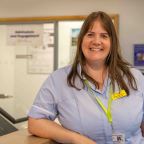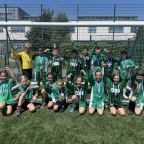
New course improves teaching for autistic children
A new course for teachers and teaching assistants has been created in Plymouth to improve understanding and advance the techniques used to teach children with autism in mainstream schools.
Five talented teachers will be receiving their Post Graduate Certificate (PG Cert): Autism Spectrum Condition at a ceremony on Wednesday 17 July at Plymouth University’s Roland Levinsky Building.
This is the first group to have successfully completed the new programme of study, which has been created through a partnership between the International Masters Programme (IMP) at Plymouth University and Plymouth City Council’s Communication Interaction Team (CIT), responsible for supporting young people with social communication needs and autistic spectrum condition in schools across the city.
The partnership was formed in 2012 with the aim of developing an accredited training programme to enable people to take on the role of either Autistic Spectrum Condition (ASC) designated teacher or Teaching Assistant (TA) roles in their schools.
Councillor Nicky Williams, Cabinet Member for Children and Young people, said: “Teaching children with additional communication needs requires understanding and skill. This specialism is increasingly recognised in today’s education system and in Plymouth we want to ensure teaching staff are well equipped and rewarded for their knowledge, experience and skills. But most importantly, we want the best education for our children, regardless of their needs.”
The PG Cert is based around two Masters level modules, one which focuses on understanding the autism spectrum and a second; on ways of promoting learning in students with autism. It includes the completion of a portfolio to demonstrate practice in ASC friendly strategies and approaches within a school setting or working role. Each of the two Masters level assignments is worth 30 credits; with a total of 60 credits to gain the award of PG Cert ASC.
These credits can be used as a starting point, or they can be added to Masters level credits from previous study, to work towards a Masters in Education with Plymouth University.
A total of 33 teachers and teaching assistants have taken part in the pilot group, completing their taught course in March 2013 and of those, 21 have submitted Practice Portfolios to show what they have learned. Five have successfully completed both modules and submitted portfolios to receive the PG Cert ASC and a further four hope to complete by September 2013.
Initial funding for the pilot was provided by the Department for Education via Plymouth Universities IMP programme and Plymouth City Council, with contributions from its Children’s Integrated Disability Service and the Communication Interaction Team, both within the Council’s Department for Education, Learning and Family Support.
The partnership and course was conceived and developed by Mike Murphy, Senior Lecturer in Education at Plymouth University and Mary Pittman, who teaches modules in autism and SEN. Liz McKenzie, a member of the IMP team, has also provided guidance, support and input to the tutors delivering the course.
Mike said: “The course has been a successful and fruitful collaboration between all involved. A range of professionals have been able to research and learn together with of the aim of developing personal and professional insights in order to enhance learning and greater participation for young people within the city.”
A further 14 people have signed up to complete their PG Cert by March 2014.
Mary Pittman said: “The participants on the course come from a range of primary and secondary school settings in Plymouth and are committed to raising standards of education for all children and young people on the autism spectrum, as well as developing autism friendly strategies and learning environments to support their wellbeing. It has been a real privilege working with them and within the collaborative partnership.”
Claire Layland CIT Team Manager, who co-teaches the PG Cert Autism programme, added: “We’ve had a fantastic team of people working very hard to make this programme a success. That includes support from ASC advisory teachers and specialist support workers from the team, plus parents of children with ASC and adults, who themselves have autism. It’s an incredibly worthwhile programme of study.”










